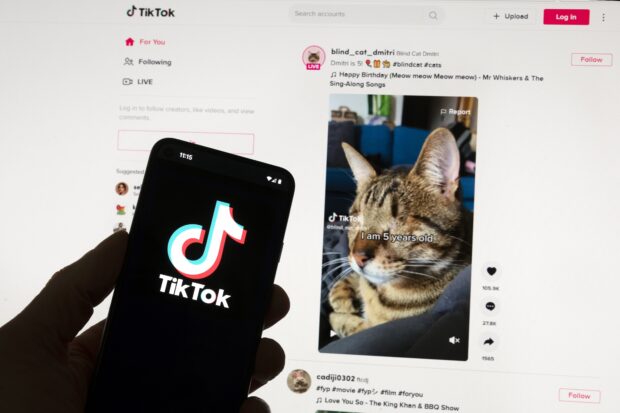The TikTok logo can be seen on a smartphone positioned in front of a computer screen displaying the TikTok home screen. This was captured on Saturday, March 18, 2023, in Boston. Europe’s biggest tech companies, including Google, Facebook, and TikTok, are about to experience a significant shift in their online operations. As of Friday, August 25, European Union citizens will have the ability to customize their online experience on popular social media platforms such as TikTok, Instagram, and Facebook, as well as tech giants like Google and Amazon. This is due to the implementation of a groundbreaking new set of digital regulations known as the Digital Services Act, designed to safeguard the privacy, transparency, and removal of harmful or illegal content for European users. Here are five notable changes you can expect when you log on:
1. AI-Recommended Videos Can be Turned Off: Automated recommendation systems, based on individual profiles, determine the content that appears in users’ feeds. However, users now have the option to disable these systems. Meta, the parent company of Facebook and Instagram, allows users to opt out of its artificial intelligence ranking and recommendation systems, which dictate which Instagram Reels, Facebook Stories, and search results are displayed. Instead, individuals can choose to view content exclusively from the accounts they follow, starting with the most recent posts. Similarly, TikTok will no longer show videos based on users’ previous viewing habits in the “For You” feed. Instead, it will showcase popular videos from their local area and around the globe. Disabling recommender systems on TikTok will also result in the “Following” and “Friends” feeds displaying posts from followed accounts in chronological order. Snapchat users will have the option to opt out of personalized content experiences. These algorithmic recommendation systems based on user profiles have been criticized for creating “filter bubbles” and driving social media users towards increasingly extreme content. The European Commission aims to provide users with at least one alternative for content recommendations that is not based on profiling.
2. Reporting Harmful Content Is Easier: Users will find it simpler to report posts, videos, or comments that violate a platform’s rules or break the law. TikTok has introduced an “additional reporting option” for users to report illegal content, including advertising. To pinpoint the problem, individuals can select from categories like hate speech, harassment, suicide and self-harm, misinformation, or frauds and scams. The app has also set up a team of moderators and legal specialists to review user-flagged videos, in addition to its existing automated systems and moderation teams. Meta states that its existing tools for reporting content are now more accessible, without providing further details.
3. Clearer Explanations for Content Removal: Platforms are now expected to be more transparent about their operating processes. For example, TikTok promises to provide European users with more information “about a broader range of content moderation decisions.” If a video is deemed ineligible for recommendation due to unverified claims about an ongoing election, TikTok will inform users of this decision. They will also share more details about the decision-making process, including whether the action was taken by automated technology. Both content creators and those who file a report will be given an explanation of how to appeal a decision. Google has also stated that it will expand the scope of its transparency reports to provide more information on how it moderates content in various services.
4. Reporting Fake Products: The Digital Services Act not only focuses on content, but also aims to combat the circulation of counterfeit goods. Amazon has introduced a new channel for reporting suspected illegal products and content, while also providing more publicly available information about third-party merchants. The online retail giant claims to invest heavily in protecting its store from illegal activity and creating a trustworthy shopping experience. Zalando, an online fashion marketplace, is also implementing flagging systems, although it asserts that it has minimal risk of illegal content due to its highly curated collection of designer items.
5. Protection Against Targeted Ads for Kids: The European Union is taking measures to restrict digital advertising targeted at children, citing concerns over privacy and manipulation. Some platforms have already begun tightening their restrictions, both within and beyond Europe. For instance, TikTok has limited the use of certain data to show ads to teenagers. Users aged 13 to 17 from the EU, the UK, Switzerland, Iceland, Norway, and Liechtenstein will no longer see ads based on their activities on or off TikTok. Similar measures have been implemented in the United States for 13- to 15-year-olds. Snapchat is also restricting personalized and targeted advertising for users under the age of 18. Meta has ceased displaying ads to 13- to 17-year-olds on Facebook and Instagram based on their activity and now only uses age and location data as targeting criteria for this age group.
These are just a few of the changes that European users can expect as the Digital Services Act goes into effect. The EU aims to create a safer and more user-friendly online environment, giving individuals greater control over their digital experiences. With these regulations, Europe is leading the way in holding tech giants accountable for their impact on users’ privacy, access to information, and exposure to harmful content.
Denial of responsibility! VigourTimes is an automatic aggregator of Global media. In each content, the hyperlink to the primary source is specified. All trademarks belong to their rightful owners, and all materials to their authors. For any complaint, please reach us at – [email protected]. We will take necessary action within 24 hours.


